What is fluoride?
Fluoride is a naturally occurring mineral that can be found in both fresh and salt
water, soil, and numerous foods including:

Spinach

Grapes and Raisins

Brewed black tea and coffee

Fish (fresh or canned), crab, and shrimp

Food prepared in or with fluoridated water
What types of fluoride do dental and dental hygiene offices use?
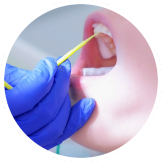
Varnish painted on the teeth (most effective)
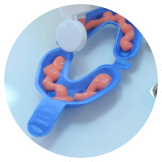
Gel or foam applied in trays (moderately effective)

Mouth rinse (least effective)
Do I need a fluoride treatment?
Your dental hygienist will assess your oral health and let you know if you
need
a fluoride treatment. A fluoride treatment may be right for you if you have:
- Poor oral hygiene
- Signs of demineralization (white spots) on your teeth
- Dry mouth or decreased saliva
- An eating disorder (e.g., anorexia, bulimia)
- Weak enamel
- Previous history of cavities
You may also benefit from a fluoride treatment if you have had head and neck
radiation or if you live in
a community without fluoridated drinking water.
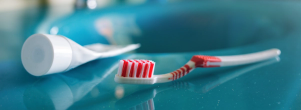
Why is my dental hygienist recommending I have
at-home fluoride?
If your dental hygienist determines that you are at a high risk for
developing cavities, they may recommend daily or weekly at-home fluoride
treatments. These could be in the form of a highly fluoridated toothpaste,
at-home trays filled with gel or fluoride mouth rinses.

Can fluoride help with my sensitive teeth?
Yes, fluoride can help. A fluoride varnish absorbs into the tooth
structure and hardens the enamel to prevent pain and sensitivity triggered
by cold, sweet or sour foods.
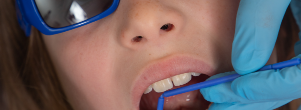
Is a fluoride treatment recommended for
children?
Yes. Children as young as 3 can have a fluoride varnish application.
Fluoride varnish is the most effective and easiest way to strengthen their
tooth enamel to prevent cavities.
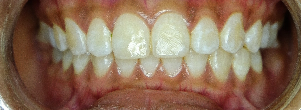
What is dental fluorosis?
Dental fluorosis is a condition that develops
when children under age 8 consume too much fluoride.
This excess fluoride makes white spots on their developing adult teeth.
Although dental fluorosis
changes the way teeth look, it does not affect the structure or health of the
teeth. To avoid fluorosis,
it's important to teach your children to spit out toothpaste and not swallow
it.
Silver diamine fluoride (SDF)
SDF is a clear, odourless liquid that contains silver particles and fluoride. It kills the
bacteria that causes cavities, and helps harden the decayed area

Who may benefit from SDF? People:
- on a wait list for dental care
- with more decay than can be treated in one appointment
- with baby teeth that will soon fall out
- with limited mobility who have challenges accessing dental care
- with special needs, dental phobias, intellectual/behavioural conditions
- living in remote locations

What are the benefits of SDF?
- stops cavities from getting bigger
- can prevent and reduce tooth sensitivity
- application is quick and painless
- freezing (needles) or sedation is not needed
- the cost of SDF treatment is a fraction of the cost for a filling
How often should I have a fluoride treatment?
Most adults with good oral health only need a fluoride treatment once a
year.